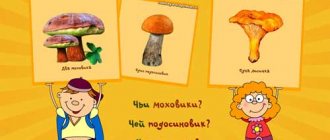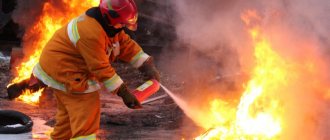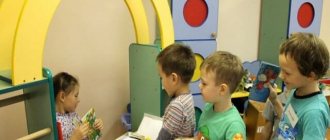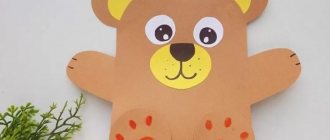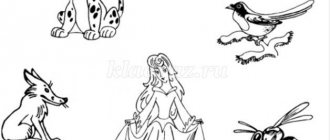Project “Agricultural professions” project on speech development (senior group) on the topic
Introduction to professions.
Download:
| The attachment | Size |
| proekt_s-h_professii.docx | 24.83 KB |
Preview:
Project “Introduction to agricultural professions”
Project type: informational - creative.
Project participants: children of senior preschool age, teachers, parents.
Duration: long-term (September - November).
— preschoolers do not have clear ideas about the variety of work activities of adults;
— knowledge about the specific actions of some professions in agriculture has not been formed.
— Expand children’s understanding of agriculture.
— Introduce agricultural professions.
- Cultivate cognitive interest.
- arouse interest in the proposed activity; develop ideas about human agricultural activities.
- help children understand the importance and necessity of each profession in agriculture (farmer, agronomist, veterinarian, milkmaid, tractor driver, calf raiser, grain grower, combine operator).
— consolidate children’s knowledge about the sequence of stages of growing bread; practice the correct use of the names of agricultural equipment (tractor, combine, seeder, harrow).
— to cultivate respect for rural workers, to cultivate interest in these professions, to impart a feeling of love for the countryside, its beauty, simplicity, and inseparable connection with nature.
- develop coherent speech, form a grammatical structure of speech, consolidate the ability to form adjectives from nouns; understand the meaning and wisdom of folk proverbs.
- use various non-traditional techniques, develop children’s creative abilities, create maximum freedom to show initiative and imagination.
- enrich children's gaming experience.
— to cultivate interest in teamwork in the process of creating a photo album and an exhibition of drawings.
Priority educational area: cognition.
Integration of educational areas: socialization, communication, work, reading fiction, artistic creativity, safety, music.
Personal socialization occurs due to the fact that children constantly have to communicate with each other, independently plan joint work, distribute responsibilities among themselves, and interact with adults, not only teachers, but also representatives of other professions.
Preschoolers' ideas about the variety of professions in agriculture and the role of modern technology in work are superficial. Children have little understanding of agricultural professions, because... Most of the population lives in cities. Children do not see how cereals are grown and have no idea how and where bread, vegetables and cereals come from in stores. This project will help expand children's understanding of the work of adults, introduce them to the professions: farmer, agronomist, veterinarian, milkmaid, tractor driver, grain grower, calf farmer, combine operator.
The relevance of the project is that modern urban children know little about the life of people in the village, their professions, and the significance of their work. It is worth noting that preschoolers have unsystematic and fragmented knowledge about modern professions of adults. Using the example of agricultural professions, it is necessary to give children specific knowledge and ideas about work, teach them to value it, working people, working on the topic of this project.
- children will acquire knowledge and ideas about professions in agriculture;
- think about the importance and necessity of each profession;
— children will have a desire to think about choosing a future profession.
The role of parents in the implementation of the project: Help in preparing illustrations and photographs, drawings by children on this topic, participation in joint events, dialogue conversations with children on the topic of the project.
Stages of work on the project
Stage I (Preparatory) –
Studying literature about the work of agricultural workers, the experience of kindergartens from different cities and regions of Russia. Conducting a survey of parents in order to identify...... Preparation of presentations, illustrations, story pictures on this topic. Selection of didactic games, exercises, video materials, literary works. Preparing attributes for activities with children.
Stage II (Main) –
Long-term project implementation plan
NOD: “Tractor Driver”, “The Work of Vegetable Growers and Gardeners” “Combine Operators and Tractor Drivers”.
Games: “On the farm. Equality, inequality”, “Gathering the harvest”, “What’s in borscht, what’s in compote”, “Guess by taste”, “Guess by smell”, “What grows where?”, “Find by description”, “Tops, roots” , “Body”, “Select color and shade”.
Conversations: “What is a village?”, “What is agriculture?”, “What do people do in the village?”, “Let’s talk about the profession of grain grower”, “What knowledge should a farmer have to successfully run a farm”, “Would you like choose a profession as a veterinarian? “Where do the products from which food is prepared come from?”, “Agricultural transport”, “Who lives where?”, “About the benefits of vegetables for our body.”
Speech development: Compiling a descriptive story based on A. Plastov’s painting “Haymaking”. Development of coherent oral speech. Retelling based on questions. Writing descriptive stories.
Games: “Finish the sentence”, “Correct the mistake”, “Say it differently”, “Say it in one word”.
Vocabulary work (learn to correctly agree a noun with an adjective in gender, number and case)
Looking at paintings from the series “Who should I be?” Learning poems about animals. Guessing riddles about tools and agricultural machinery.
Word game “Guess the word” based on the poem by D. Rodari “What do crafts smell like?”
Familiarization with fiction: Learning the poem by E. Blagina “Come to the Garden”, O. Driz “Garden Garden”.
Poems: S. Mikhalkov “Who to Be”, D. Kedrin “Indian Summer”, I. Pivovarov “Autumn Treasure”. Fairy tales: “Turnip”, “Kolobok”, “Spikelet”, “Havroshechka”, “Lipunyushka”. Stories: V. Golyavkin “I Want a Horse”, E. Uspensky “Three from Prostokvashino”, L. Shulpyakov “My Happy Village”.
Interaction with parents: Looking at photographs of relatives living in the village. Parents' stories "How I spent the summer in the village, village." Design of a photo collage “At Grandma’s in the Village”, with a descriptive story about your work.
Creation of the album “Who Helps the Farmer.”
Theatrical activity: Dramatization of the Russian folk tale “Tops and Roots.” Theatrical game: “How a man sold a cow.” Games of transformation into animals.
Artistic and creative activities: Drawing: “Gardeners”, “Agricultural equipment”, “On the farm”. Modeling: “Garden tools”, “Which of the domestic animals lives on the farm.” Application: “What grows on the farm.”
Listening to songs: “Antoshka”, “Harvest”, a song from the musical “Mama” - “Our village is good”.
Construction and constructive game "Farm".
Didactic games: “Who needs what for work”, “Professions”, “Collect a picture”, “What professions are there?”, “Who lives on the farm, what does the farmer give?”, “Farmers”, “Tops - roots”, “ What grows in the field”, “Find a pair”, “Guess the profession”.
Outdoor games: “Golden Gate”, “Kite and Hen”, “Gardener”, “Sly Fox”, “Helpers”, “Harvest”, “Gardener”, “Chauffeur” (carrying agricultural products to the market).
Physical education “All professions are needed, all professions are important”
Role-playing games “Dragonfly and Ant”, “Farmers”, “Bird Family”
Presentation of the project: exhibition design: “Farmer - who is he...”
Labor activity: “Sowing onions.”
Cognitive and research activity: “Comparison of wheat flour and starch.”
Excursion to the garden. Observations of adults working in the garden.
Stage III (Generalizing) –
Summing up the project implementation, satisfaction survey of parents and teachers, monitoring results.
Project defense - final presentation of the project at the parent meeting (slide show).
Conclusions and effectiveness of the project.
Preschoolers became interested in this topic. A holistic idea has been formed about the work activity of adults in agriculture, about professions - farmer, agronomist, veterinarian, milkmaid, tractor driver, calf raiser, grain grower, combine operator. In the process of this work, children learned about the history of wheat, where bread came from, and what significance it has in human life. We learned riddles, poems, proverbs, and sayings. Through reading fiction, adults were taught a caring and respectful attitude towards products and work in agriculture. In the process of work, close interaction with the family was established, strengthening parent-child relationships. As the results showed, we accomplished the tasks we set.
The presentation of project activities included: the product of joint activities of children, teachers and parents.
- Belaya K.Yu., Teselkina N.V., Murzina M.R., Shchetkina T.T., Prokopovich O.I., Rymarenko L.V. Organization of project activities in preschool educational institutions. / Belaya K.Yu., Teselkina N.V., Murzina M.R., Shchetkina T.T., Prokopovich O.I., Rymarenko L.V. - M.: TC "Perspective", 2013. - 104 p.
- Danyukova A. Do you like projects? // Hoop. - 2001. - No. 4. - pp. 11-13.
- Dybina O.V., Rakhmanova N.P., Shchetinina V.V. The unknown is nearby: Entertaining experiences and experiments for preschoolers. / Dybina O.V., Rakhmanova N.P., Shchetinina V.V. - M.: Sphere shopping center, 2001.-192 p.
- Savenkov A.I. Educational research in kindergarten: issues of theory and methodology.//Preschool education. – 2000. – No. 2. – P.8-17.
- Ryzhova N.A. Environmental education in kindergarten. / Ryzhova N.A. - M.: Karapuz, 2000.
- Ryzhova N. A. Program “Our home is nature”: block of lessons “Me and Nature” / Ryzhova N. A. - M.: LLC "KARAPUZ-DIDACTICS", 2005. - 192 p.
- Shaehova R.K. Nature and child. / Shaehova R.K. — Kazan, 2002
- Nikolaeva S. N. Education of environmental culture in preschool childhood: Methods of working with children of the preparatory group of kindergarten: A manual for teachers of preschool educational institutions. / Nikolaeva S. N. M.: Education, 2002. - 144 p.
- Ashikov V.I., Ashikova S.G. Semitsvetik: Program and guide to cultural and environmental education and development of preschool children. / Ashikov V.I., Ashikova S.G. - M., 2007.
- Methodological literature edited by L.G. Gorky and T. Bondarenko.
On the topic: methodological developments, presentations and notes
Project goal: To introduce children to various professions of adults. To form labor skills in older preschoolers. To provide initial career guidance for children with didactic and methodological
Clarify and generalize children’s ideas about professions.
Project passport Type of project: – informational – creative. Relevance: In preschool years, children show a keen interest in the work of adults, in play and everyday life they strive to imitate them and want to do something themselves.
Summary of direct educational activities (DEA) in the middle group on the topic: “Professions” (educational area “Cognitive Development”). Purpose: Summarize knowledge on the topic “Professions”. Objectives: Arr.
Short-term project with the goal: To give children an idea of the profession of “Cook” through role-playing games.
The goal of this project is to expand the range of children’s knowledge about professions, to form clear ideas about work as a social phenomenon that meets human needs. Acquainted.
Summary of the lesson “Agricultural professions” (senior group)
Summary of the lesson “Agricultural professions” (senior group)
Objectives: Educational: to reinforce with children the names of agricultural professions, to expand knowledge about work in the village;
Developmental: to form the moral qualities of the child’s personality: independence, respect for work, patriotism; develop speech, enrich children’s vocabulary, continue to develop memory, attention, thinking, develop cognitive interest
Educational: to cultivate a love of nature, to cultivate respect for working people, to cultivate interest in blue-collar professions
Preliminary work. Reading
fiction: (stories by L.F. Voronkova “Sunny Day”, V. Sokolovsky “Milk River, Kiselnye Banks”, K.D. Ushinsky
"Caring Cow"); examination of reproductions of paintings by artists: A. Plastov “Summer”, I.I. Shishkina
"Rye"; reading poems by writers: A.A. Fet “The rye is ripening over the hot cornfield...”, E. Trutneva “Golden Corridor”; conversations about pets in rural areas. Excursion to the farm SPK PMZ "Dmitrievy Gory"
Equipment. Illustrations, pictures of people in the professions of animal husbandry: milkmaid, calf shepherd, veterinarian, shepherd, machine operator; pictures of cows, a herd of cows, a farm, a milking machine; multimedia projector with a presentation about professions on the farm; tape recorder for physical education.
Educator: Once upon a time, people
They learned not just to hunt animals, but to specifically breed them. This activity is called agriculture. Agricultural workers need to know a lot about plants and animals, be able to properly grow and care for them. But the main thing, guys, is that more than anything in the world you need to love the earth. Without this you cannot achieve good results.
Agricultural workers put a lot of work into growing a good harvest, so that domestic animals produce more milk, meat, and eggs; Their work is not easy, it takes a lot of effort and time. Nowadays, agricultural workers' work is made easier by technology, which they must understand well. After all, to plow the land
To sow grain, to cut hay to feed cows, sheep and horses, you need to be able to handle special equipment: tractors, mowing machines, combines, watering machines. Therefore, agriculture cannot do without special professions. Today we will get acquainted with different
our professions in the countryside.
Educator. Guys, do you like to solve riddles? Guess it!
White water
It will be useful to all of us. From white water
Do whatever you want: Cream, yogurt, Butter for our porridge, Cottage cheese for a pie - Eat it, Vanyusha - my friend! Eat and drink, serve for the guests, and don’t be sorry for the cat!
Educator. That's right, you guessed it, it's milk. Where does milk come from? Guess the riddles and you will immediately find out.
Educator. “It’s motley, it eats green, it gives white,” “In the middle of the yard there is a haystack: in front there is a pitchfork, in the back there is a broom.”
Children. A cow, she gives milk. Educator. Of course, this is co-
mova. What animal is a cow? Why?
Child. A domestic animal lives near a person’s house, and the person takes care of it.
Educator. One cow produces as much milk as one family needs. Where can we get milk to feed all the children in kindergarten, all the big cities, since milk is on our table every day? (Children’s answers)
Educator. Large farms are being created in villages, where many, many cows are kept. They are looked after by special people from different professions. Today we will get to know them.
Round dance game “We walked through the woods”
We walked through the woods
And we met a matryoshka. (children walk in a circle)
“I’m tired,” she says (palms pressed to cheeks)
My leg hurts (hands on my belt, shaking my leg)
You, matryoshka, don’t be sad! (pat the neighbor standing next to him on the shoulder) You need to rest! (squats,
hands under the cheek)
And then get ready
Then hit the road by car! (walk in a circle)
Children sit on chairs.
Educator. A long time ago, people learned to specifically breed domestic animals. This type of human activity is called animal husbandry.
(Show children pictures of a farm)
Educator. A milkmaid and a machine operator work at the farm to care for the animals. The machine operator prepares feed for the animals and ensures that all mechanical equipment works on the farm.
Educator. Who knows what cows eat?
Children. In summer - grass, in winter - hay.
Educator. That's right, but not only this, cows need a wide variety of food.
